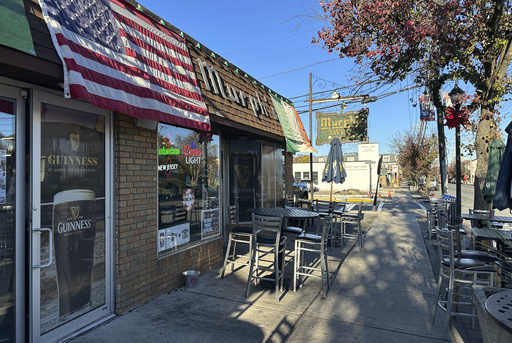
TOTOWA, N.J. — Customers at Murph’s Tavern are celebrating Donald Trump’s return to political prominence, particularly noting his success in a northern New Jersey county that has traditionally leaned Democratic. The significance of this shift is palpable among the locals, especially as they view it through their own experiences and hardships.
Maria Russo, a bartender and single mother of two, expressed how the economic climate has directly impacted her life and those around her. She pointed out the rising costs of living and how difficult it has become to manage household finances. “It’s clear to anyone paying attention,” she noted. “When I shop, I feel the pinch just like everyone else.”
Trump’s recent electoral gains have highlighted the stark political divisions still present across the United States. He managed to expand his support in unexpected regions, from the suburbs of New Jersey to the heart of New York City’s Democratic stronghold, and even in the historically liberal areas of Hawaii, where support for the Democratic nominee Kamala Harris has waned.
According to a comprehensive survey of over 120,000 voters, Trump achieved notable progress among Black and Latino men, nonwhite voters without college degrees, and younger individuals since the 2020 election. Common issues like the economy and immigration emerged as primary concerns for many voters. Increased numbers reported that their families were facing financial struggles compared to previous years—a sentiment that weighed heavily in their decision-making process when it came to voting.
In Hawaii, a state controlled by Democrats for decades, Republicans have started to see victories in various districts. Notably, Julie Reyes Oda, a Republican teacher, successfully flipped a state House seat in Ewa Beach, demonstrating Trump’s influence even in working-class regions. Further, newly elected Republican state Senator Samantha DeCorte illuminated ongoing safety concerns in her area, expressing residents’ fears about being out at night for mundane tasks such as grocery shopping.
Economic challenges have significantly affected housing affordability in Hawaii, with many residents, including Native Hawaiians, finding it necessary to relocate to the mainland U.S. to maintain their livelihoods. In New Jersey, polling data revealed a stronger backing for Trump among nonwhite suburban voters and younger females, with about half of respondents believing Trump would better manage the economy compared to Harris.
Passaic County particularly stands out as a critical area, marking the first time in over thirty years that a Republican presidential candidate won there. Polls and interviews indicate that Trump’s focus on the economy resonated with voters in various demographic groups, often leading to significant shifts in support.
Richard F. Bensel, a political historian, observed the growing divide between urban and suburban experiences, noting that people commuting into Manhattan live quite differently than those residing in the city’s core. This difference in lifestyle, he suggested, has fueled resentment among suburban voters who feel overlooked and unheard.
Supporters like Sebastian Giraldo, an Air Force member, voiced their discontent with the current trajectory of the nation. Despite previously voting for Biden, Giraldo felt the struggles of everyday life, including grocery prices and overall living conditions, could not be ignored.
Ramon Ramirez-Baez, a seasoned writer and community activist, expressed similar sentiments, admitting he voted for Trump despite his long-standing affiliation with the Democratic Party. He attributed recent neighborhood decay to the Biden administration’s immigration policies, indicating a shift away from traditional party alignment in response to local conditions.
The political landscape is changing, and issues such as the U.S. stance on the Gaza conflict have severely influenced Muslim voters in important swing states like Michigan. Selaedin Maksut, a local activist, shared his choice to vote for the Green Party as a form of protest against the Democratic Party’s handling of certain social issues.
In the wake of these developments, local politicians continue to navigate the evolving political landscape. U.S. Rep. Andy Kim winning in Passaic County signifies how residents may distinguish between local and national issues, often favoring candidates who address their specific concerns about governance and community needs.
Figures like Alexandria Ocasio-Cortez have also acknowledged the complexities of split-ticket voting. She has reached out to voters who support both her and Trump, highlighting the significance of dialogue and understanding across party lines—an idea that resonates in places like Totowa.
The implications of Trump’s improved performance in areas typically aligned with Democratic values could lead to a reevaluation among Democrats about their strategies and voter relations. Former state legislator Ralph Caputo remarked on the necessity for Democrats to connect meaningfully with diverse voter segments, emphasizing that complacency in previous election cycles must be abandoned if they wish to maintain political relevancy.
For many voters, the recent electoral outcomes highlight a crucial moment of reflection and potential change across the American political spectrum, reshaping the very essence of party allegiance and voter priorities.
